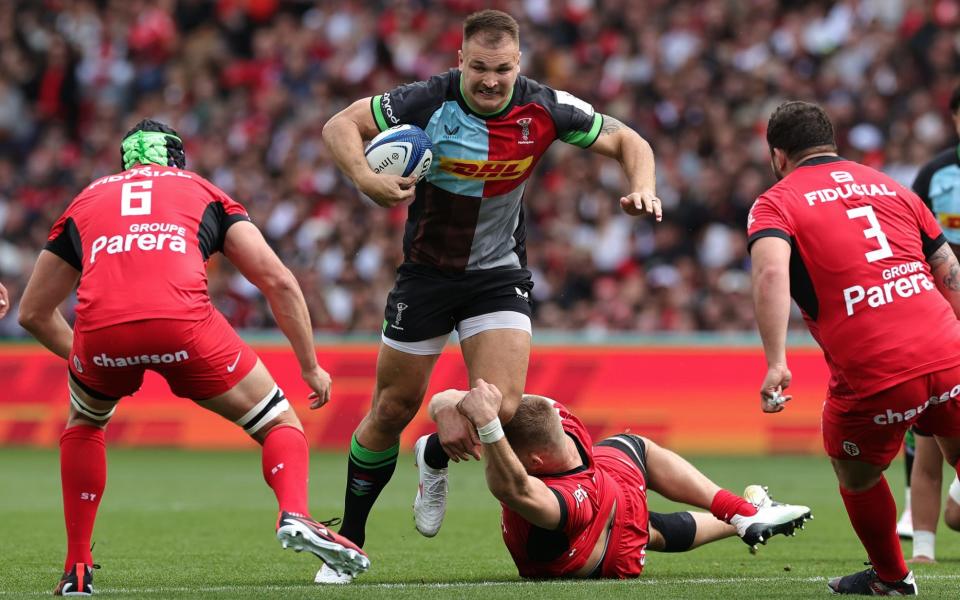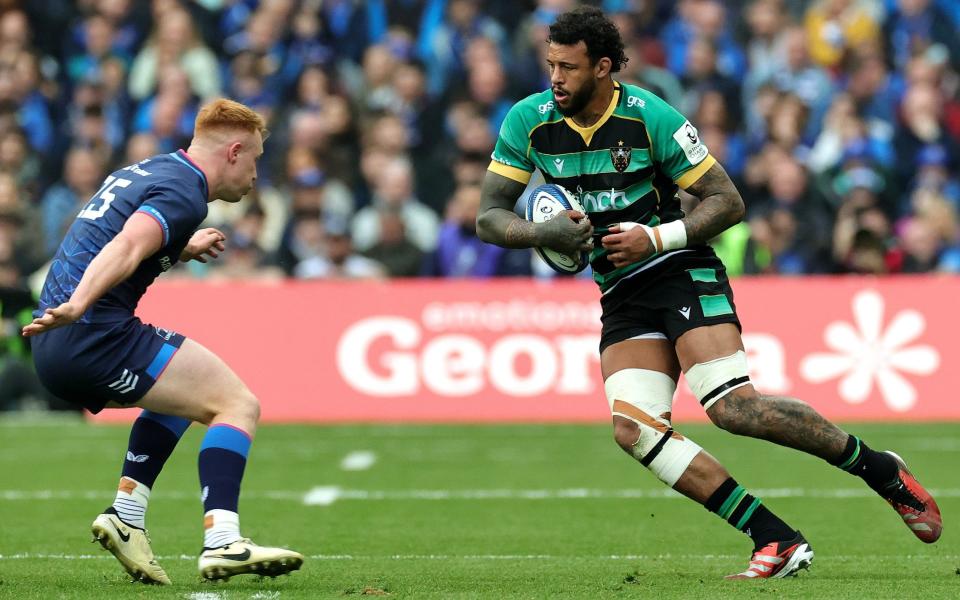What Premiership clubs must do to conquer Europe

The sight of Andre Esterhuizen acknowledging Harlequins fans after his team’s 38-26 loss in Toulouse was layered in its poignancy.
On the face of things, this was a heartfelt farewell. Esterhuizen, among the best imports the Premiership has had, is moving on at the end of the season. A loss to Antoine Dupont’s men ended his prospects of winning the Champions Cup with Harlequins.
Additionally, though, there was the lingering, sobering thought that the London club might not get as good an opportunity to reach the final for some time. Harlequins are also losing Louis Lynagh, who is bound for Benetton to join new Italy colleagues. Will Collier, an elite scrummaging tighthead, is understood to be departing as well.
Northampton Saints, equally defiant the previous day at Croke Park, will be without Courtney Lawes, Lewis Ludlam and Alex Moon for the 2024-25 campaign. Lawes was immense against Leinster and Moon, just 27 and in the midst of his best season, threw a fabulous pass to set up George Hendy’s try.
Those two Premiership teams can be proud of mixing it with European superpowers, perhaps showing that the gap between the best and the rest is not as wide as most assumed. Painful experiences have been shown to benefit teams in the future, too. That said, the cold reality is that Harlequins and Saints must now rebuild to a certain degree.

We can talk about breakdown penalties, botched chances and misfiring line-outs, yet this will be the fourth consecutive season that an English club has not featured in a Champions Cup decider. Prospective contenders must prioritise bigger rocks ahead of the minutiae.
Clever recruitment
Lifting the Champions Cup is not supposed to be easy, and the collective might of this year’s field is encapsulated by two supreme finalists. Leinster and Toulouse tap into the synergy of familiar combinations – which we will explore later – and influential imports. Judging by the volume and recipients of cheers on Sunday, Blair Kinghorn and Jack Willis are already among the most popular members of Ugo Mola’s squad. If you think Leinster look strong now, remember that they are adding RG Snyman and Jordie Barrett next season.
A salary cap increase for 2024-25 will give Premiership clubs more spending clout, though that is mitigated somewhat by the reduction of permissible ‘exempt’ players from two to one. Bath have brought in Ross Molony, a ball-playing lock with shrewd line-out knowledge, as well as Guy Pepper from Newcastle Falcons. Saracens have focused on loosehead prop and fly-half. Titi Lamositele seems to be a Collier contingency for Harlequins.
Saints have secured the signing of Josh Kemeny and are thought to be on the look-out for another lock-blindside to complement a trio of lower-league arrivals that they hope to polish. Appointing players is just the start. Even if you identify an individual who has the attribute to fulfil a certain role – Rob Baxter views Immanuel Feyi-Waboso as a roaming Jack Nowell replacement, for instance – shrewd coaching must accompany recruitment.
Danny Care, who claimed that “the odds are stacked against English sides” in the Champions Cup, put it a different way on Sunday. “You can’t bridge the gap [with Toulouse] in terms of financial [spend],” said the Harlequins scrum-half. “The only way you can do it is probably how us and Saints have and that’s by giving it a crack and just backing your squad.”
Coaching alignment and conditioning
In the bowels of Stadium de Toulouse, Danny Wilson was asked how Premiership clubs could continue to compete at the top table. “Our job as a group of coaches, senior players, and as a club generally, is to develop as much as it is to sign rockstars,” he explained.
“You need your high-end, top quality rugby players to compete with the likes of Toulouse who have huge depth of quality. But what I’m excited about, or what we know our role is, is to bring through Fin Baxter, Chandler Cunningham-South, you could list them off – young players who are the future of Harlequins, the future of English rugby.”
Cunningham-South is a slightly different case given that Harlequins signed him from London Irish. But Baxter, excellent against Bordeaux Bègles in the quarter-final, is a great example of how to cultivate and cherish homegrown talent. The 22-year-old loosehead prop more than held his own on Sunday against Dorian Aldegheri, a France tighthead who was bolstered by the hulking Emmanuel Meafou behind him. Quality, coherent coaching throughout a club keeps academy production, the lifeblood of most successful sides, rolling. Then integrating youngsters into the first-team is a skill in itself.
“It’s not just coaching,” Wilson added. “It’s conditioning, the whole holistic approach to bringing a player through. Fin Baxter has started a European quarter-final and European semi-final and has not looked out of depth at all. He’s done that through having senior players above him who have really helped him, having coaches who have helped him, and a work-ethic to push through and develop.
“We have to expose players to this level of rugby. There is some pain that comes with exposing young lads to this level of rugby, but the learnings, the kick-on, is massive for them and for Harlequins.”
Conditioning, and how fitness is tailored to tactics, is a critical pillar of performance. Northampton endeavoured to become steelier last summer with a focus on gym work. Despite handling errors, they stood up to Leinster in the contact area and in the scrummaging exchanges. Harlequins absorbed some fearfully powerful passages from Toulouse and just about stayed in the fight, throwing plenty of their own punches and running the hosts off their feet in the third quarter.
Canny retention and patience
These pillars are interdependent. But if the goal is to develop cohesion – that unavoidable buzzword of the sport – then it is vital to retain a familiar core of players and to play a waiting game so that coaching plans can come to fruition. Leinster are held up as a paragon in this regard. Half-backs are an obvious focal point, and the mutual understanding of Dupont and Romain Ntamack, honed over years, underpins so much of what Toulouse do well.
Alex Mitchell and Fin Smith endured difficult moments as a pair in Dublin. Saints will know that time together will yield greater composure and accuracy. In Fraser Dingwall, Tommy Freeman, Ollie Sleightholme, Hendy and others, Phil Dowson has a precocious pool of backs maturing together. Similarly, Harlequins will aim for Will Porter to develop his relationship with Alex Dombrandt and Marcus Smith so that the scrum-half can succeed Care as the middle man of an intuitive 8-9-10 trio.
Bath have extended several contracts in recent months, including that of their head of rugby, Johann van Graan, besides numerous players such as Sam Underhill and Joe Cokanasiga. Again, the salary-cap increase will have enabled that process. Baxter is excited about the Chiefs group that he has assembled, and how they can learn from a campaign in which they reached a Champions Cup quarter-final and went toe to toe with Toulouse for over a half. Sound planning aids chances of silverware.
Conviction and luck
The truth is that these aspects will not guarantee a Champions Cup victory, such is the arduous nature of the tournament. Fortune plays a part as well. As an example, Northampton recruited extremely well before this season. But Tom Pearson and Burger Odendaal were both unavailable to face Leinster, with Ludlam and Ollie Sleightholme also out. Victors do tend to have a steadfast conviction in their tactical principles, which allows coaches to make the most of their resources.
Small moments can cause significant ripple effects. Caelan Doris’ 84th-minute try against Leicester Tigers in the pool stage earned a bonus point that sent Leinster past Northampton into the second seed spot. That was the difference between a semi-final in Dublin and one in England. Home advantage in the knockout rounds seemed useful this weekend.

